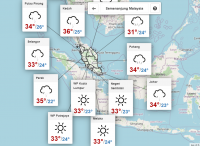LOS ANGELES – July 2023 was hotter than any other month in the global temperature record since 1880, according to analysis released by Nasa’s Goddard Institute for Space Studies (GISS) today, reported Xinhua.
July 2023 was 0.24°C warmer than any other July in Nasa’s record, and it was 1.18°C warmer than the average July between 1951 and 1980, according to the analysis.
“Nasa data confirms what billions around the world literally felt: temperatures in July 2023 made it the hottest month on record. In every corner of the country, Americans are right now experiencing firsthand the effects of the climate crisis,” said Nasa administrator Bill Nelson.
Parts of South America, North Africa, North America, and the Antarctic Peninsula were especially hot, experiencing temperature increases around 4°C above average, according to Nasa data.
Nasa assembles its temperature record from surface air temperature data from tens of thousands of meteorological stations, as well as sea surface temperature data acquired by ship- and buoy-based instruments.
High sea surface temperatures contributed to July’s record warmth, according to Nasa. The agency’s analysis shows especially warm ocean temperatures in the eastern tropical Pacific, evidence of the El Niño that began developing in May 2023.
Overall, extreme heat this summer put tens of millions of people under heat warnings and was linked to hundreds of heat-related illnesses and deaths, according to Nasa.
The record-breaking July continues a long-term trend of human-driven warming driven primarily by greenhouse gas emissions that has become evident over the past four decades.
According to Nasa data, the five hottest Julys since 1880 have all happened in the past five years.
“The science is clear this isn’t normal. Alarming warming around the world is driven primarily by human-caused greenhouse gas emissions. And that rise in average temperatures is fueling dangerous extreme heat that people are experiencing here at home and worldwide,” said GISS director Gavin Schmidt.
“Climate change is impacting people and ecosystems around the world, and we expect many of these impacts to escalate with continued warming,” said Katherine Calvin, chief scientist and senior climate advisor at Nasa’s HQ in Washington DC.
Extreme heat has continued to impact much of the United States.
The US National Weather Service issued heat alerts for about one-third of Americans on Sunday, as temperatures continue to remain at dangerous triple digits for millions of residents.
Over 115 million Americans are under heat alerts across 16 US states. – Bernama, August 15, 2023





















